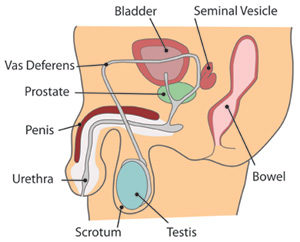Analysis of semen quality
Most of the investigations of the male in connection with infertility are based on assessment of the production of adequate numbers of good quality sperm. Tests for the male include:
Semen analysis
This is the most common test and every male patient will be required to have at least two of these. Often sperm counts fluctuate significantly from one specimen to the next. In most cases, semen analysis tests are done over a period of time during the early stages of investigations to ensure accurate results. It can be an embarrassing procedure for many men but it is an absolutely essential test and treatment will not go ahead unless all requested semen analyses are carried out.
The test includes a sperm count as well as a detailed look at the shape (morphology) of the sperm and the speed at which they are swimming (motility). The semen may also be tested to see if it contains antibodies if this is thought necessary.
A sperm count greater than 20 million/ml with 25% rapidly progressing sperm and greater than 3% morphologically ideal sperm is considered normal.
The swim-up test
This is basically a test of the swimming ability (motility) and fitness of the sperm. It is usually carried out in conjunction with a semen analysis and involves the washing of sperm in a special liquid or culture media and then a measurement of their ability to swim-up into a fresh layer of media.
This test gives an indication of the ability of the sperm to reach the egg under normal conditions.
Blood tests
It may be necessary to assess levels of the hormones FSH and testosterone if you are found to have a very low sperm count. This test tells us whether you have a blockage or your testicles are failing to produce sperm.
Ultrasound scan
An ultrasound scan of the scrotum can detect problems such as varicocele (varicose veins on the testicles) and hydrocele (liquid filled cysts on the testicles) which can affect sperm quality.
